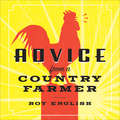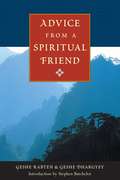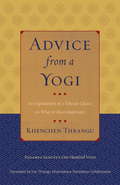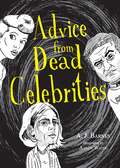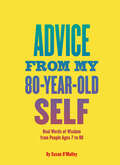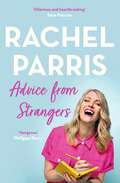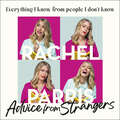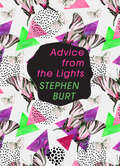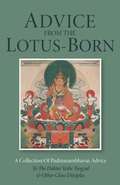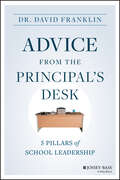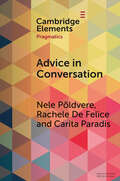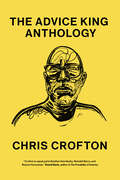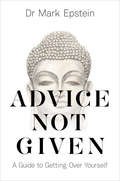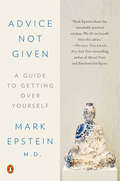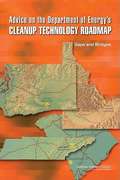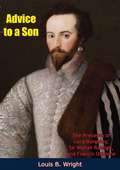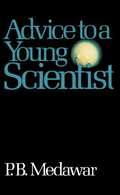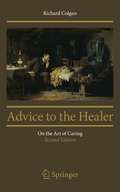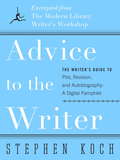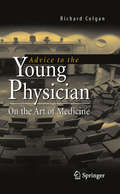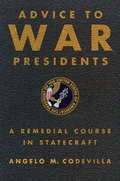- Table View
- List View
Advice from a Country Farmer
by Roy EnglishThe author of Don&’t Whiz on an Electric Fence and When I Am an Old Coot spreads some down-home, hard-won, gut-busting facts. Dishing out witty one-liners and old-fashioned country logic the same way an old camp cook dishes out beans and biscuits, Roy English&’s Advice from a Country Farmer is simply this—no-nonsense humor and wisdom from a country gentleman schooled in common sense and kindness. &“Most farmers work only half a day; the other twelve hours they do other stuff.&”&“When you wallow with pigs, expect to get dirty.&”&“Don&’t skinny dip with snapping turtles.&” &“Horsepower is no substitute for horse sense.&”&“The only farmers who sleep late are in the cemetery.&” &“Nobody works harder than a farmer, except maybe a farmer&’s wife.&”
Advice from a Spiritual Friend
by Geshe Rabten Geshe Dhargyey"Do not wish for gratitude. Never strike at the heart. Now if you die, you will have no regrets. " - The Seven-Point Thought Transformation Like wise old friends, two Tibetan masters offer down-to-earth advice for cultivating compassion, wisdom, and happiness in every situation. Based on practical Buddhist verses on "thought training" (lojong), Advice from a Spiritual Friend teaches how to develop the inner skills that lead to contentment by responding to everyday difficulties with patience and joy. Following Stephen Batchelor's introduction to the Kadamapa tradition that gave rise to these earthy, pithy instructions, Part One is a commentary by Geshe Dhargyey to Atisha's (982-1054) Jewel Rosary of a Bodhisattva. Part Two includes a commentary by Geshe Rabten to the famous Seven-Point Thought Transformation. First published in 1977, Advice from a Spiritual Friend is a Wisdom classic that has enriched readers in many editions over the years. As Batchelor says in his introduction, "These teachings are as applicable today as they were when Atisha first introduced them to Tibet. "
Advice from a Spiritual Friend
by Sharpa Tulku Brian Beresford Geshe Rabten Stephen Batchelor Gonsar Tulku Geshe Dhargyey"Do not wish for gratitude. Never strike at the heart. Now if you die, you will have no regrets." --The Seven-Point Thought TransformationLike wise old friends, two Tibetan masters offer down-to-earth advice for cultivating compassion, wisdom, and happiness in every situation. Based on practical Buddhist verses on "thought training" (lojong), Advice from a Spiritual Friend teaches how to develop the inner skills that lead to contentment by responding to everyday difficulties with patience and joy. Following Stephen Batchelor's introduction to the Kadamapa tradition that gave rise to these earthy, pithy instructions, Part One is a commentary by Geshe Dhargyey to Atisha's (982-1054) Jewel Rosary of a Bodhisattva. Part Two includes a commentary by Geshe Rabten to the famous Seven-Point Thought Transformation. First published in 1977, Advice from a Spiritual Friend is a Wisdom classic that has enriched readers in many editions over the years. As Batchelor says in his introduction, "These teachings are as applicable today as they were when Atisha first introduced them to Tibet."
Advice from a Yogi: An Explanation of a Tibetan Classic on What Is Most Important
by Thrangu Dharmakara Translation Collab Khenchen Thrangu Padampa SangyeThe urgency of spiritual practice has seldom been as simply and powerfully conveyed as it is in Padampa Sangye's One Hundred Verses. This Tibetan Buddhist classic is an antidote to the tendency we all have to waste our precious human lives. Khenchen Thrangu's lively commentary on the text brings to light its subtleties and amplifies its applicability to our daily struggles, showing how an understanding of its teaching on impermanence is the key to working with common difficulties such as loneliness, craving, betrayal, competitive colleagues, or squabbling families. It speaks to us today as profoundly as it did to the people of Dingri, Tibet, to whom it was first addressed a millennium ago.
Advice from Dead Celebrities
by A. J. BarnesIf celebrities that have gone to a better place could come back and give us one piece of priceless advice, what would it be? Karen Carpenter: Breakfast is the most important meal of the day.John F. Kennedy: Don't mess with Texas.Mama Cass: Chew your food thoroughly and carefully.James Dean: Click it or ticket! From presidents to pop stars, Advice from Dead Celebrities imagines what pearls of wisdom the dearly (sometimes darkly) departed would impart to us. Complete with hilarious illustrations of our favorite dead celebs, this one-of-a-kind volume will make readers die laughing.
Advice from Dead Celebrities
by A. J. BarnesIf celebrities that have gone to a better place could come back and give us one piece of priceless advice, what would it be? Karen Carpenter: Breakfast is the most important meal of the day. John F. Kennedy: Don't mess with Texas. Mama Cass: Chew your food thoroughly and carefully. James Dean: Click it or ticket! From presidents to pop stars,Advice from Dead Celebritiesimagines what pearls of wisdom the dearly (sometimes darkly) departed would impart to us. Complete with hilarious illustrations of our favorite dead celebs, this one-of-a-kind volume will make readers die laughing.
Advice from Dead Celebrities
by A. J. Barnes Aaron WaiteIf celebrities that have gone to a better place could come back and give us one piece of priceless advice, what would it be? Karen Carpenter: Breakfast is the most important meal of the day. John F. Kennedy: Don't mess with Texas. Mama Cass: Chew your food thoroughly and carefully. James Dean: Click it or ticket! From presidents to pop stars, Advice from Dead Celebrities imagines what pearls of wisdom the dearly (sometimes darkly) departed would impart to us. Complete with hilarious illustrations of our favourite dead celebs, this one-of-a-kind volume will make readers die laughing.
Advice from My 80-Year-Old Self: Real Words of Wisdom from People Ages 7 to 88
by Susan O'Malley“The voices gathered here display incredible wit, sincerity, and generosity; we are lucky to be able to listen to them.” —ArtforumIf you had the opportunity to meet your eighty-year-old self, what do you think she/he would tell you?That is the question artist Susan O’Malley, who was herself to die far too young, asked more than a hundred ordinary people of every age, from every walk of life. She then transformed their responses into vibrant text-based images. From a prompt to do things that matter to your heart, to a reminder that it’s okay to have sugar in your tea, these are calls to action and words to live by—heartfelt, sometimes humorous, and always fiercely compassionate. This stirring celebration of our collective humanity unveils the wisdom we hold inside ourselves right now.“Everyone, regardless of age, can take something away from this uplifting work.” —Real Simple
Advice from Strangers: Everything I know from people I don't know
by Rachel Parris'Warm witty and wise.' --RICHARD OSMAN'Hilarious, wise and heart breaking. Like an all-night over-share with your best friend.' --SARA PASCOE'Rachel is one of my favourite comedians. This book is warm, wise and hilarious. It is written in her comic voice - a voice she mainly has used to tell me off, so I am thrilled to see it deployed in this way.' --NISH KUMAR'The most joyful bursts of wisdom from a truly funny soul. I adore this book.' --CARIAD LLOYD'Hilarious, original and wise. This is essential reading.' --ELLIE TAYLOR'Rachel is one of the wisest, funniest people I know. Funny, sad, beautiful and ridiculous, Advice from Strangers has it all.' --PIPPA EVANS'A hilarious, fiery, reassuring hug of a book. Full of laughter, compassion and feminist wisdom.' --FRAN BUSHE'An essential, hilarious handbook for life.' --ATHENA KUGBLENUCOMEDIAN RACHEL PARRIS WAS ASKED TO GIVE AN INSPIRING GRADUATION SPEECH. WHO DID SHE ASK FOR ADVICE? TOTAL STRANGERS...Over the course of a year award-winning comedian Rachel Parris asked members of her live audience for advice. Here she takes those random bits of wisdom - such as 'Be Kind' or 'Never Pass Up the Opportunity for a Wee' - and explores them in ways that are funny and serious, hilarious and heart-breaking. This uplifting feminist manifesto of a book outlines the essentials of living in the modern world; dealing with everything from Tampons to Tories and from #hashtags to Staying Hydrated.
Advice from Strangers: Everything I know from people I don't know
by Rachel Parris'Warm witty and wise.' --RICHARD OSMAN'Hilarious, wise and heart breaking. Like an all-night over-share with your best friend.' --SARA PASCOE'Rachel is one of my favourite comedians. This book is warm, wise and hilarious. It is written in her comic voice - a voice she mainly has used to tell me off, so I am thrilled to see it deployed in this way.' --NISH KUMAR'The most joyful bursts of wisdom from a truly funny soul. I adore this book.' --CARIAD LLOYD'Hilarious, original and wise. This is essential reading.' --ELLIE TAYLOR'Rachel is one of the wisest, funniest people I know. Funny, sad, beautiful and ridiculous, Advice from Strangers has it all.' --PIPPA EVANS'A hilarious, fiery, reassuring hug of a book. Full of laughter, compassion and feminist wisdom.' --FRAN BUSHE'An essential, hilarious handbook for life.' --ATHENA KUGBLENUCOMEDIAN RACHEL PARRIS WAS ASKED TO GIVE AN INSPIRING GRADUATION SPEECH. WHO DID SHE ASK FOR ADVICE? TOTAL STRANGERS...Over the course of a year award-winning comedian Rachel Parris asked members of her live audience for advice. Here she takes those random bits of wisdom - such as 'Be Kind' or 'Never Pass Up the Opportunity for a Wee' - and explores them in ways that are funny and serious, hilarious and heart-breaking. This uplifting feminist manifesto of a book outlines the essentials of living in the modern world; dealing with everything from Tampons to Tories and from #hashtags to Staying Hydrated.
Advice from Strangers: Everything I know from people I don't know
by Rachel ParrisCOMEDIAN RACHEL PARRIS WAS ASKED TO GIVE AN INSPIRING GRADUATION SPEECH. WHO DID SHE ASK FOR ADVICE? TOTAL STRANGERS...Over the course of a year award-winning comedian Rachel Parris asked members of her live audience for advice. Here she takes those random bits of wisdom - such as 'Be Kind' or 'Never Pass Up the Opportunity for a Wee' - and explores them in ways that are funny and serious, hilarious and heart-breaking. This uplifting feminist manifesto of a book outlines the essentials of living in the modern world; dealing with everything from Tampons to Tories and from #hashtags to Staying Hydrated. (P) 2022 Hodder & Stoughton Limited
Advice from the Lights: Poems
by Stephanie Burt“The brightest and most inviting of Burt’s collections for readers of any, all, and no genders.”—Boston ReviewAdvice from the Lights is a brilliant and candid exploration of gender and identity and a series of looks at a formative past. It’s part nostalgia, part confusion, and part an ongoing wondering: How do any of us achieve adulthood? And why would we want to, if we had the choice? This collection is woven from and interrupted by extraordinary sequences, including Stephanie poems about Stephen’s female self; poems on particular years of the poet’s early life, each with its own memories, desires, insecurities, and pop songs; and versions of poems by the Greek poet Callimachus, whose present-day incarnation worries (who doesn’t?) about mortality, the favor of the gods, and the career of Taylor Swift. The collection also includes poems on politics, location, and parenthood. Taken all together, this is Stephen Burt’s most personal and most accomplished collection, an essential work that asks who we are, how we become ourselves, and why we make art.
Advice from the Lotus-Born
by Tulku Urgyen Rinpoche Padmasambhava Marcia Binder Schmidt Erik Pema Kunsang" Don't mistake mere words to be the meaning of the teachings. Mingle the practice with your own being and attain liberation from samsara right now." PadmasambhavaPadmasambhava is the primary master of Vajrayana, the teachings for our time. Out of his great compassion and wisdom, he instructed his main disciple Yeshe Tsogyal to conceal terma treasures to be revealed at the destined time for future practitioners. The profundity of this advice is meant to be personally applied by all individuals in all circumstances. It is a classic work, which contains valid truth for anyone who sincerely wants to follow a spiritual path."The chief compiler of Padmasambhava's teachings was Yeshe Tsogyal, an emanation of a female Buddha. There may be some people who believe that only men can attain enlightenment, but her life is proof to the opposite. The awakened state of mind is neither male or female." Tulku Urgyen Rinpoche, from Introductory Teachings
Advice from the Principal's Desk: 5 Pillars of School Leadership
by David FranklinAn insightful and original take on educational leadership Advice from the Principal’s Desk: 5 Pillars of School Leadership is a fresh, new take on school leadership from award-winning former school administrator and professor of education Dr. David Franklin. In the book, you’ll find the tools and strategies that veteran school administrators need to succeed in their roles. You’ll learn how to increase attendance and parental involvement in student affairs, minimize suspension, navigate budget cuts, and more. The author explores five key areas that school leaders cannot neglect and examines how busy school leaders should spend their extremely limited time. You’ll also discover: Strategies you can deploy to best support your students and other stakeholders How to navigate the often-conflicting demands of parents, teacher unions, and governing bodies How to best use and implement technology to support your work and create a positive and productive school environmentAn ideal resource for current and aspiring K-12 principals and school administrators, Advice from the Principal’s Desk is packed with the research, real-world examples, and practical techniques that education professionals need to improve the results of their leadership.
Advice in Conversation: Corpus Pragmatics Meets Mixed Methods (Elements in Pragmatics)
by Carita Paradis Nele Põldvere Rachele De FeliceThis Element is a contribution to a new generation of corpus pragmatics research by taking as its starting point the multifaceted nature of speech acts in conversation, and by adopting a mixed-methods approach. Through a unique combination of theoretical, qualitative, quantitative, and statistical approaches, it provides a detailed investigation of advice-giving and advice uptake in relation to (i) the range of constructions used to give advice in different discourse contexts and at different points in time, and (ii) their interaction with dialogic and social factors of advice uptake as key components of frames of advice exchanges in natural conversation. Using data from the London-Lund Corpora of spoken British English, the Element shows, firstly, that there are systematic differences in advising between discourse contexts over the past half a century, and, secondly, that who gave the advice and how they did it are the strongest predictors of the advisee's response. This title is also available as Open Access on Cambridge Core.
The Advice King Anthology: The Advice King Anthology
by Chris CroftonSince the fall of 2014, The Advice King has been one of the most widely read sections of alt-weekly the Nashville Scene. The Advice King Anthology contains the best of those columns, with new In-the-Meantime notes, a new introduction, and a foreword by writer Tracy Moore. If you are looking for traditional advice, this might not be the book for you. But if you care to find the incendiary, subversive, and hilarious alongside actual thoughts about addiction, depression, gentrification, politics, poetry, music, economic policy, living in New Nashville, and (inevitably) romance, the Advice King has much to offer.
Advice Not Given: A Guide to Getting Over Yourself
by Dr EpsteinOur ego, and its accompanying sense of self-doubt, is one affliction we all share. And while our ego claims to have our best interests at heart, in its never-ending pursuit of attention and power, it sabotages the very goals it sets to achieve. In Advice Not Given, renowned psychiatrist and author Dr Mark Epstein reveals how Buddhism and Western psychotherapy both identify the ego as the limiting factor in our wellbeing and both come to the same conclusion: when we give the ego free rein, we suffer; but when it learns to let go, we are free.Our ego is at once our biggest obstacle and our greatest hope. We can be at its mercy or we can learn to mould it. Completely unique and practical, Epstein's advice can be used by all, and will provide wise counsel in a confusing world.
Advice Not Given: A Guide to Getting Over Yourself
by Mark EpsteinOur ego, and its accompanying sense of nagging self-doubt as we work to be bigger, better, smarter, and more in control, is one affliction we all share. And while our ego claims to have our best interests at heart, in its never-ending pursuit of attention and power, it sabotages the very goals it sets to achieve. In Advice Not Given, renowned psychiatrist and author Dr. Mark Epstein reveals how Buddhism and Western psychotherapy, two traditions that developed in entirely different times and places and, until recently, had nothing to do with each other, both identify the ego as the limiting factor in our well-being, and both come to the same conclusion: When we give the ego free reign, we suffer; but when it learns to let go, we are free. With great insight, and in a deeply personal style, Epstein offers readers a how-to guide that refuses a quick fix, grounded in two traditions devoted to maximizing the human potential for living a better life. Using the Eightfold Path, eight areas of self-reflection that Buddhists believe necessary for enlightenment, as his scaffolding, Epstein looks back productively on his own experience and that of his patients. While the ideas of the Eightfold Path are as old as Buddhism itself, when informed by the sensibility of Western psychotherapy, they become something more: a road map for spiritual and psychological growth, a way of dealing with the intractable problem of the ego. Breaking down the wall between East and West, Epstein brings a Buddhist sensibility to therapy and a therapist's practicality to Buddhism. Speaking clearly and directly, he offers a rethinking of mindfulness that encourages people to be more watchful of their ego, an idea with a strong foothold in Buddhism but now for the first time applied in the context of psychotherapy. Our ego is at once our biggest obstacle and our greatest hope. We can be at its mercy or we can learn to mold it. Completely unique and practical, Epstein's advice can be used by all--each in his or her own way--and will provide wise counsel in a confusing world. After all, as he says, "Our egos can use all the help they can get. "
Advice on the Department of Energy's CLEANUP TECHNOLOGY ROADMAP: Gaps and Bridges
by National Research Council of the National AcademiesBeginning with the Manhattan Project and continuing through the Cold War, the United States government constructed and operated a massive industrial complex to produce and test nuclear weapons and related technologies. When the Cold War ended, most of this complex was shut down permanently or placed on standby, and the United States government began a costly, long-term effort to clean up the materials, wastes, and environmental contamination resulting from its nuclear materials production. In 1989, Congress created the Office of Environmental Management (EM) within the Department of Energy (DOE) to manage this cleanup effort. Although EM has already made substantial progress, the scope of EM's future cleanup work is enormous. Advice on the Department of Energy's Cleanup Technology Roadmap: Gaps and Bridges provides advice to support the development of a cleanup technology roadmap for EM. The book identifies existing technology gaps and their priorities, strategic opportunities to leverage needed research and development programs with other organizations, needed core capabilities, and infrastructure at national laboratories and EM sites that should be maintained, all of which are necessary to accomplish EM's mission.
Advice to a Son: The Precepts of Lord Burghley, Sir Walter Raleigh, and Francis Osborne
by Louis B. Wright“Guides to conduct are common to all ages, for writers never cease to believe that the distillation of their wisdom will in some fashion improve the behavior of youth and provide useful instruction to their elders. The sixteenth century was a particularly didactic age and had more than its share of self-appointed instructors with faith in their missions.” So writes Louis B. Wright in his Introduction to Advice to a Son.This volume makes available three of the most famous sets of precepts. The manuals attributed to Lord Burghley and Sir Walter Raleigh and a treatise compiled by Francis Osborne are indicative of both the aspirations and the morals of the sixteenth and seventeenth centuries, and they provide an index to the social attitudes of the age.Immensely popular and influential, they were often reprinted, quoted from, and plagiarized. Some students of Shakespeare profess to see a parallel between Polonius advice to Laertes and Burghley’s practical counsel to his son Robert.The advice that these treatises offer is materialistic and even cynical, because the writers, moving in a political milieu, were realists who were attempting to provide instruction to their sons that would ensure success they would have cared not at all for the idealistic niceties. The distinction and position of Burghley and Raleigh may in part account for the popularity of their manuals in the seventeenth century, long after their deaths, but obviously both works possessed qualities congenial to the age, and readers approved of the way they mingled virtue and pragmatism.Of the three works, Dr. Wright comments, Osborne’s “must be regarded as a literary creation in addition to being a practical manual composed for the use of a particular person.”The student of English history will find this book a valuable addition to his library.
Advice to a Young Scientist
by P. B. MedawarTo those interested in a life in science, Sir Peter Medawar, Nobel laureate, deflates the myths of invincibility, superiority, and genius; instead, he demonstrates it is common sense and an inquiring mind that are essential to the scientist’s calling. He deflates the myths surrounding scientists--invincibility, superiority, and genius; instead, he argues that it is common sense and an inquiring mind that are essential to the makeup of a scientist. He delivers many wry observations on how to choose a research topic, how to get along wih collaborators and older scientists and administrators, how (and how not) to present a scientific paper, and how to cope with culturally ”superior” specialists in the arts and humanities.
Advice to the Healer: On the Art of Caring
by Richard ColganThis book introduces the origins of important teachings that form the basis of medicine and related healing professions. Reinforcing the humanistic side of patient care, this book replicates the tips, anecdotes and aphorisms often related by mentors and educators to medical students, residents, and young physicians. This book provides numerous examples of best practices in the art of medicine, profiles of great healers throughout history and around the world, and stories sure to inspire any practicing healer, whether they are new to the calling or a seasoned veteran.
Advice to the Writer
by Stephen KochFrom Stephen Koch, former chair of Columbia University's graduate creative writing program, comes essential and practical advice drawn from The Modern Library Writer's Workshop. With nearly thirty years of teaching experience, Stephen Koch has earned a reputation as an astute and benevolent mentor; and with Advice to the Writer, his lucid observations and commonsense techniques have never been more accessible. Here Koch dispenses sound guidance for those moments when the muse needs a little help finding her way: in "Shaping the Story," he untangles plot; in "Working and Reworking," he explains the most teachable (yet least often taught) of all writerly skills: revision; and in "The Story of the Self," he delves into autobiography. Featuring handpicked commentary from some of our greatest authors, Advice to the Writer is a unique introduction to this maddening and intoxicating pursuit. Praise for Stephen Koch's The Modern Library Writer's Workshop "An extraordinarily comprehensive and practical work by a master craftsman and a master analyst of the craft."--Madison Smartt Bell, author of All Souls' Rising and Anything Goes "Stephen Koch was my teacher long ago. Now he is everyone's teacher, indelibly. This is a book not just for the beginning writer but for every writer."--Martha McPhee, author of the National Book Award nominee Gorgeous Lies "The Modern Library Writer's Workshop is a treasure trove of wisdom, both immensely practical and philosophical, entertaining and thought-provoking. Koch takes us inside the writing process, and it is impossible not to emerge transformed."--Joanna Hershon, author of Swimming
Advice to the Young Physician: On the Art of Medicine
by Richard ColganAdvice to the Young Physician introduces the origins of important teachings that form the basis of medicine as it has been taught by some of history's greatest educators in medicine. Advice to the Young Physician reveals how to make the transition from technician to healer. This book reinforces the humanistic side of patient care, which is often overshadowed by the focus on highly technological elements. Medical students, residents, fellows, physicians, and allied health practitioners often forget the intricacies of the genomic makeup of adenoviruses, yet they remember the tips, anecdotes and aphorisms related by mentors, educators, and experienced physicians. The art of medicine comes from insights gained from unique and dynamic experiences between the physician, an enthusiastic medical student and the human patient, and is rarely found in books or taught in a universal and systematic way. Advice to the Young Physician provides numerous examples of best practices in order to internalize and practice the art of medicine, including tenets taught by Hippocrates, Maimonides, Osler, Peabody, Schweitzer and others. Advice to the Young Physician targets aspiring and new physicians with the intent to make them better physicians. It hits the mark. An effective mix of the writings of some of medicine's giants, as well as clinical experiences of the author, the book offers an historical framework and personal context to understand the attributes and attitudes of the good physician. It is a quick read that rewards the reader with a sampling of 4000 years of medical wisdom sprinkled with practical advice for the modern day doctor. --Richard G. Roberts, MD, JD, Professor of Family Medicine, University of Wisconsin School of Medicine and Public Health, President World Organization of Family Doctors, Past President American Academy of Family Physicians This is a small book and easy to read. It comprises several inspiring sketches of ancient and modern physicians whose reputations were based as much on their dedication to the humanism of medicine as it was to the science of medicine. Those who teach medical students and residents will find it a good source of medical history that, besides being important in itself, will add a new dimension and a little lightness to morning rounds. The author makes it clear that in our era of high technology it is easy to underestimate the importance of uniting humanism with science in caring for the sick. He also provides some practical information on such topics as how to present a case to attending physicians and how to communicate well with patients. The ancient physicians that history remembers were not only astute observers of signs and symptoms but also were deeply concerned about the psychological health of their patients and how disturbances in their emotional health often manifested in physical symptoms. Colgan starts with Hippocrates and Maimonides whose names many young physicians are familiar with. The former for the aphorism "first do no harm" and the latter for being one of the first to call medicine a "vocation" and a "calling." The following "greats" are included in the book: Dr Albert Schweitzer whose "reverence for life" led him to his missionary medical work in Africa. He wrote Out of My Life and Thought and received the Nobel Peace Prize in 1952. Sir William Osler (1849-1919), known to some as the father of internal medicine, was a respected physician and teacher. He was the author of the Principles and Practice of Medicine, used for decades as the bible of medicine. But his fame rested equally on his dedication as a mentor to young physicians. He often gave graduation addresses to medical students reminding them to maintain a life-long interest in continuous learning and to treat the whole patient not just the disease. Francis Weld Peabody (1881-1927) a teacher at Harvard who had written a book The Care of the Patient in which he discussed how older practitioners often complained that younger doctors' mindsets were so often over-concerned with testing that they sometimes fo...
Advice to War Presidents: A Remedial Course in Statecraft
by Angelo Codevilla"War presidents” are hardly exceptional in modern American history. To a greater or lesser extent, every president since Wilson has been a War President. Each has committed our country to the pursuit of peace, yet involved us in a seemingly endless series of wars-conflicts that the American foreign policy establishment has generally made worse. The chief reason, argues Angelo Codevilla in Advice to War Presidents, is that America’s leaders have habitually imagined the world as they wished it to be rather than as it is: They acted under the assumptions that war is not a normal tool of statecraft but a curable disease, and that all the world’s peoples wish to live as Americans do. As a result, our leaders have committed America to the grandest of ends while constantly subverting their own goals. Employing many negative examples from the Bush II administration but also ranging widely over the last century, Advice to War Presidents offers a primer on the unchanging principles of foreign policy. Codevilla explains the essentials-focusing on realities such as diplomacy, alliances, war, economic statecraft, intelligence, and prestige, rather than on meaningless phrases like "international community,” "peacekeeping” and "collective security. ” Not a realist, neoconservative, or a liberal internationalist, Codevilla follows an older tradition: that of historians like Thucydides, Herodotus, and Winston Churchill-writers who analyzed international affairs without imposing false categories. Advice to War Presidents is an effort to talk our future presidents down from their rhetorical highs and get them to practice statecraft rather than wishful thinking, lest they give us further violence.
